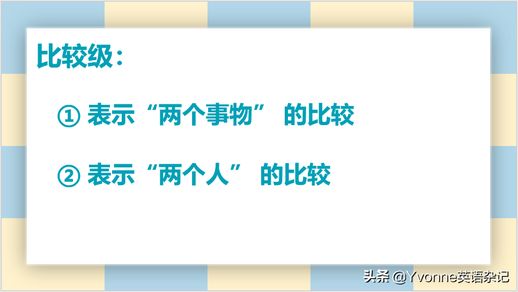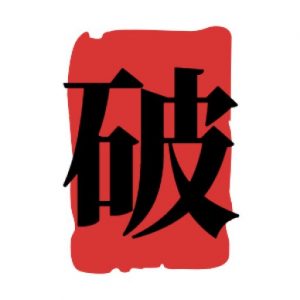old比较级 old的比较级和高级
大家好!
欢迎来到 Yvonne英语杂记!
今天我们将探讨英语中“比较级”的使用技巧。

在英语语法中,
比较级
是用于对比两个事物或人物的关键概念。它帮助我们表达一个事物在某一方面比另一个事物更具某种特质。
让我们了解如何形成比较级:
词尾加“er”
:大多数单音节形容词,通过在词尾直接加上“er”来形成比较级。

例如:
tall —— taller
strong —— stronger
great —— greater
对于那些以不发音的“e”结尾的单音节形容词,我们只需在词尾加上“r”。
nice —— nicer
large —— larger
able —— abler
对于以一个元音字母加辅音字母结尾的单音节形容词,我们需要双写最后的辅音字母,然后加上“er”。
big —— bigger
hot —— hotter
red —— redder
对于以辅音字母加“y”结尾的双音节形容词,我们将“y”改为“i”,再加上“er”。
easy —— easier
busy —— busier
funny —— funnier
对于以“ly”结尾的副词,则需在前面加“more”。
slowly —— more slowly
quickly —— more quickly
少数双音节形容词以“er”或“ow”结尾,形成比较级时在末尾加“er”。
clever —— cleverer
narrow —— narrower
对于双音节及多音节词,则需要在前面加“more”。
important —— more important
beautiful —— more beautiful
不规则变化也是比较级的一部分,需要特别记忆:
good/well —— better
bad/ill/badly —— worse
many/much —— more
little —— less
far —— farther(表示距离)
old —— older(表示新旧)
far —— further(表示程度)
old —— elder(表示年龄)
在进行比较时,我们使用形容词比较级结构“...比较级 + than...”。例如:
Tom is
taller than
his brother.
Actions speak
louder than
words.
当需要在两个选项中做出比较时,可以用“Which/Who is + 比较级, ...or ...?”
Which sweater
is cheaper
, the red one
or
the yellow one?
Who is younger, Sally
or
Alice?
在表示“两者中更...的一个”时,使用“the + 比较级”。例如:
Lucy is
the taller
of the twins.
The red one is
the better
of the two.
当描述“越来越...”的情况时,使用“比较级 + and + 比较级”或“more and more + 形容词原级”。
The tree grows
stronger and stronger
We should make our country
more and more beautiful
形容词比较级前可以用一些修饰词,如much, a little, far等。
It's
much colder
today than yesterday.
This watch is
even cheaper
than that one.
注意,比较的两者必须是可以进行比较的对象。例如:“My hair is longer than yours”比“My hair is longer than you”要正确。
在比较两个相等的事物时,用“as + 形容词原级 + as”。例如:
I'm
as tall as
you.
My feet are
as big as
yours.
还可以使用“more and more”表示“越来越...”,以及“the more...the more...”表示“越...越...”。
Our country is getting
more and more
powerful.
The more
we get together,
the
happier
we will be.
现在,来试试下面的练习题吧!
练习题
1. nice —— nicer (以不发音的e结尾,加“r”)
2. hot —— hotter (以一个元音+一个辅音结尾,双写辅音,再加“er”)
3. tall —— taller (一般规则,直接加“er”)
4. long —— longer (一般规则,直接加“er”)
5. strong —— stronger (一般规则,直接加“er”)
6. small —— smaller (一般规则,直接加“er”)
7. heavy —— heavier (以辅音字母“y”结尾,改“y”为“i”,再加“er”)
8. thin —— thinner (以一个元音+一个辅音结尾,双写辅音,再加“er”)
9. young —— younger (一般规则,直接加“er”)
10. funny —— funnier (以辅音字母“y”结尾,改“y”为“i”,再加“er”)
11. old —— older/elder (一般规则,加“er”/不规则变化)
12. short —— shorter (一般规则,直接加“er”)
接下来根据句意填入单词的正确形式:
练习题
⑴ older (关键词: than,用比较级,表示年纪大,所以用“older”)
⑵ fat (关键词: as...as,用原级,所以用“fat”)
⑶ younger (关键词: than,用比较级,所以用“younger”)
⑷ thinner (关键词: Who is ...? ...or...,选择性比较,所以用“thinner”)
⑸ bigger (关键词: Whose is ...? ...or...,选择性比较,所以用“bigger”)
继续完成练习题吧!
练习题
⑹ long (关键词: as...as,用原级,所以用“long”)
⑺ higher (关键词: than,用比较级,所以用“higher”)
⑻ better (关键词: than,用比较级,所以用“better”)
⑼ tall (关键词: as...as,用原级,所以用“tall”)
⑽ bigger (关键词: than,用比较级,所以用“bigger”)
这就是今天关于英语“比较级”的全部内容!
如有任何问题或想了解更多英语知识,请在评论区留言!
需要课件的朋友,请私信联系!
我们下期再见!

